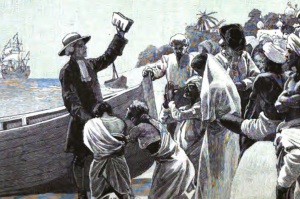Uncomfortable Words
There is an immense moral advantage in the use of ugly words to denote ugly things; language has more to do with ideals than we care to admit. When we don't like the sound of the word "lie" and so choose to say, "fib," we have made a decision to weaken the definition of falsehood. It is a euphemistic trick we learn in childhood and perpetuate throughout adulthood. Our world is full of such words games. An act of impurity is called, "indiscretion", the act of adultery an "affair." And "tolerance," the catchphrase of the modern world, sounds better than anti-truth. While absolute truth has been carefully ushered out of the picture, tolerance has been deemed the absolute picture of virtue. Even so, when we play with our words, we play with morality. "Toleration," said G.K. Chesterton, "is the virtue of people who do not believe in anything."
The Old Testament prophets called the people of Israel back to God by using harsh and graphic words. The bankruptcy of a sinful life, the worshipping of other gods, the wandering of hearts—each is very significantly described as unfaithfulness, with words like "prostitution" and "harlotry." The failure to bring the entire tithe and offering into the storehouse is portrayed as stealing from God. And the wrath of God is also spoken of with fearful intensity. It is a destructive fire that swallows and consumes. The day of God's wrath is utterly silencing—"a day of distress and anguish, a day of trouble and ruin, a day of darkness and gloom, a day of clouds and blackness" (Zeph. 1:15).
Today these words protrude like uncomfortable shards within the comfortably tolerant bubble in which we live. Whether we approach the Scriptures as a skeptic or Christian, it is improbable that we would not find certain terminology uncomfortable.
The words of the prophet Nahum are one such place of uneasiness. "A jealous and avenging God is the LORD," he begins. In the three short chapters of Nahum, our comfort level is taken on a tense ride. The prophet holds up a vivid picture of a God who judges and whose judgment brings death and destruction. His words are strong—yes, ugly; his descriptions are shocking. It is not difficult to see how some find the words of Nahum uncomfortable, perhaps even offensive. We don't know quite what to do with this God.
In what seems like an ironic twist within this message, the messenger's very name means "Comfort." And yet I have no doubt that this is a significant hint. You see, God does not play word games. His words, in fact, contradict our own games.
As Jesus stood before the scribes and Pharisees, a terrified woman cowering between them, he called out in a loud voice, "Let him who is without sin among you be the first to throw a stone at her." The woman had been caught in adultery. The scribes and Pharisees were caught at their own game. Minutes before, they were convinced that had discovered the perfect trap; they were convinced that they could manipulate words to their advantage. At Christ's response, they were silenced. Their game was contradicted. They dropped their stones and left.
God's call to judgment and his offer of mercy are not contradictory. But our moral outrage at God, while winking at immorality in our living, is contradictory.
Let us not run from his message because we are uncomfortable. His Word is sharper than a double-edged sword, dividing bone and marrow. Indeed, correction is never comfortable. But as the woman caught in adultery found, the truth is the One who corrects us is most comforting.
from Ravi Zacharias International Ministries
www.gospelcom.net/rzim




























